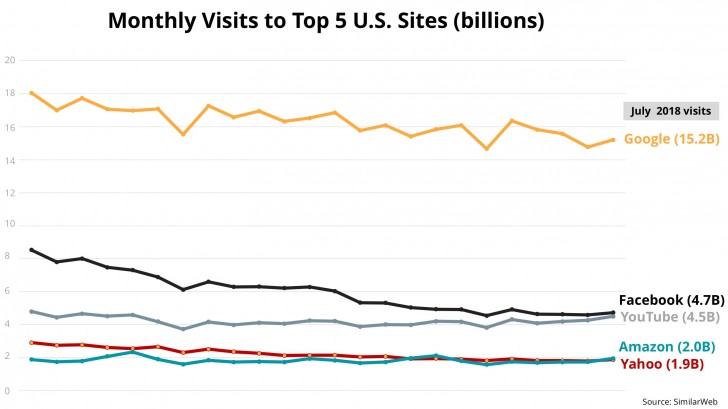
Facebook will cede its runner-up position in website traffic to YouTube in the next couple of months, according to a new study shared with CNBC by market research firm SimilarWeb.
The five websites receiving the most traffic in the U.S. in the last several years have been Google, Facebook, YouTube, Yahoo and Amazon, in that order. However, Facebook has seen a severe decline in monthly page visits, from 8.5 billion to 4.7 billion in the last two years, according to the study. Although Facebook’s app traffic has grown, it is not enough to make up for that loss, the study said.
The Facebook drop is pretty apparaent when charted.

Facebook has been growing in plenty of markets abroad and Facebook users are now spending more time on other Facebook owned platforms, including Messenger, WhatsApp, and Instagram.
YouTube is growing, in part, because of increased use on platforms like Chromecast and Smart TVs.
Facebook’s slide doesn’t matter to lawyers — at least those lawyers who grow their business by nurturing relationships and building a name.
Facebook is where more people engage more people than anywhere – online or offline. YouTube is great, but’s a democratized broadcasting platform. Broadcasting is a far cry from listening/reading and commenting in response.
Facebook is a conversation among business colleagues, friends, relatives, and community members. It’s where we hear of a customer’s wedding anniversary celebration and a business partner’s oldest child graduating from college. It’s where we receive news and commentary on a recent legal or business development — and join in the ensuing discussion.
Just yesterday Daniel Rodriguez shared (not announced) on Facebook that with his role complete as Dean at Northwestern Law School he will be headed to Stanford Law School for the fall semester. Likes and comments congratulating him and welcoming him to California ensued from colleagues and friends.
Rodriguez wouldn’t think of leaving the professional and personal interaction with people on Facebook anymore than he would think of leaving Twitter, where he is a force of nature in driving discussuion among innovators in the law, world-wide.
For lawyers and other professionals using Facebook, the discussion only gets richer as we connect and engage to get to know people better, to learn and to build a reputation.
Sure there are those who fear Facebook. They’ll look at the news of Facebook’s website traffic decline as validation that Facebook is evil or a waste of time.
It doesn’t matter to the increasing number of legal professionals who see the growing value of Facebook.
Comments
Post a Comment